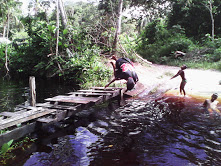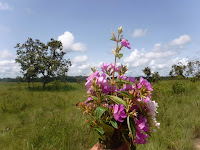My dad made me coffee my first full day back and for some reason the Keurig didn't get the coffee piping hot... I hesitated drinking it because it hadn't boiled for long enough. My dad thought that was the funniest thing ever... in Guyana, boiling your water is no joke!
The other night, my nephew wanted to eat raw carrots so my mom peeled him some. He ate a bite and said he didn't want it after all... my mind traveled to purchasing carrots in the market in Guyana, and how expensive they were... how much of a luxury item they were for some families. I am sure my poor nephew didn't mean it, but it hit me hard the waste that we don't even think of. Disposing/recycling boxes and plastic/glass containers I can't help but think of all the school supplies and storage containers we could make out of them.
Another situation that I find myself in throughout the day is greeting people. In Guyana you say hello to everyone, whether it is "Good Morning", "Afternoon", or "Good Night (as in hi how are you tonight?"). I say these things to persons as I pass them on the street and I get the funniest of looks, like I am offending them by talking to them, or am a crazy person. It bothered me the first few times and made me feel like an awkward person... but after reflection, I decided this is something that I am going to keep doing, regardless of the response I get. Some people may appreciate a hello and you never know who you will meet. So if someone passes you on the street and wishes you a "mornin", just smile and say "mornin" right back.
So these are just a few of the things that pop out as hitting me weird. A few more quick ones: ordering coffee at Coffee Obsession; pumping gas; using the "Chip" card on my debit card (it takes me forever to figure out); Spotify; I forget all the radio stations I listented to for years and had to scan to find them; customer service (being served promptly when out to eat); a variety of beer or ANYTHING really; an endless supply of ice out of the ice maker; my dog not getting attacked by dogs; iphones; being cold in 80 degree weather; my buffalo chicken not being spicy enough because Guyana Pepper Sauce burned my tongue off for two years.
Please just be patient with me.
So before I left Guyana I wrote up a little thing about lessons learned. Here it is:
Lessons from serving in the Peace
Corps:
Understanding: We all come with
our own host of experiences, education, social and economic
backgrounds, religious or spiritual beliefs, customs, and
superstitions. No person is better or worse for what they have grown
to become or believe. All of our cultures are different and that is
what makes us as a human species special. It is important to take
time to understand why a person has a certain belief before jumping
to conclusions or judging them. I have avoided many conflicts or
getting myself into a tizzy by taking a step back and simply asking,
“tell me about why you think this, or why you said this?” I
avoided many conflicts by asking this, and in turn, explaining my
beliefs as well, which is one of the Peace Corps goals (sharing about
American culture, values and beliefs). It would be so easy to call
my host family crazy for telling me I have to walk in the door
backwards after night falls to confront the jumbies
(ghosts/evil-doers) that may have followed me home, and ask them to
stay outside. But this is their belief; it would be disrespectful to
ignore it or criticize them. And let's face it, we could all afford
to ask the jumbies to stay out of our lives.
Compartmentalizing: As a
humanitarian, I can't change behaviors in every person, feed every
child, rescue every animal or save every tree. The list can become
overwhelming when you think of all that needs to be done, or see an
animal suffering or children coming to school without food every day.
It is so easy to fall into the trap of “I must do this this and
this and this and this,” and then in the end, not follow through on
what you can accomplish to build capacity. What we can do is all we
can do. It may sound bad, but you really have to pick and choose your
battles; whether it is what can be done, or giving in to locals when
they are adamant about something in a project you want to do
differently. I like to think of the Starfish Story when thinking
about the work I have done here: I may not have reached everyone, but
those I did, I made a difference for these kids, families or animals,
and that is what matters. Someday, those kids that I worked with will
hopefully spread the lessons and love I showed them to others.
Reactions: Bad things happen to
people all the time, all over the world. We can't control many of the
bad things that happen, but what is within our control is how we
react. I could either curl up, call it a day, want to give up and go
home, or I could choose to dig deep, find a lesson in what happened
and know that if I can get up and keep going it will make me stronger
and more resilient. Looking back, I will know that if I could
overcome this thing that happened, I can overcome anything. Empower
yourself.
Necessity: We are very
resourceful as human beings. I didn't think I was in this category
before I came to Guyana, but now, after 2 years in Guyana, I know for
a fact I can put this on my resume. I have found ways to re-attach a
bicycle basket with limited supplies while riding from the village
water pump; I made a cone from a strainer for my dog after she was
spayed and almost pulled her stitches out; I desperately craved pizza
and figured out how to cook one on the stove in a pan WITHOUT an OVEN
or Trader Joe's ready-made pizza dough and sauce; I made my own table
out of scrap wood; I made my own closet system out of rope; I
discovered how to cook a cake by double boiling it; I replanted basil
from the market and now have the biggest bush of basil I have ever
seen... and, out of craving, taught myself to make pesto and homemade
marinara sauce. Finally, sick of cold showers every day, I made
myself a hot bucket bath by boiling water. All the comforts of home
can be found out of desperation, when you just put a little thinking
into it.
Peace Corps: There are certainly
ups and downs. There are days when you wonder, am I getting through
to people? What am I doing here? Am I actually making a difference?
There were days when I couldn't get out of bed; I felt like I was
constantly being watched and judged 24/7 because I was a foreigner,
almost like I was a novelty. I learned to ignore the stares and came
to embrace the fact that I had a responsibility to get out of bed
and show them who I am as an American, what I believe and how I
really do care about what happens outside of my American bubble.
Because I chose to get out of bed, I discovered that there would also
be days that made me realize that no matter how small a difference I
may be making, it is worth it. When the community comes together to
help run a library; when my students are now reading chapter books
and washing their hands with soap; when my neighbor called me to tell
me she rescued a kitten like I did; when students tell me their mom
or dad read them a story before bed; or when parents tell me how
their kids always talk about Miss Aly and how she is teaching them to
read and be nice to each other, because she loves them. So was the
Peace Corps worth it? Yes, absolutely, without a doubt yes.














































